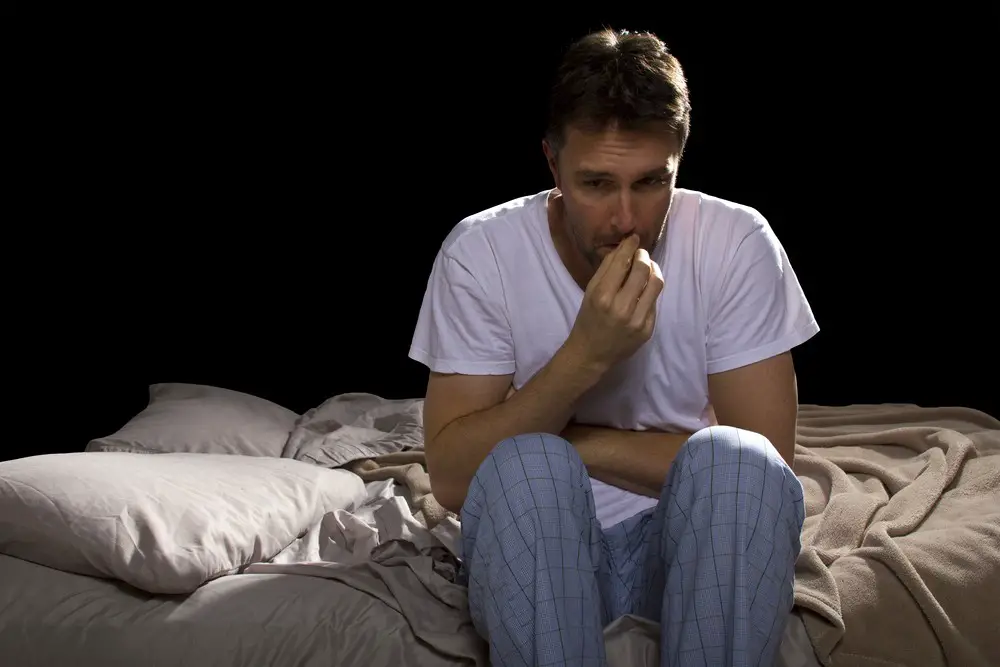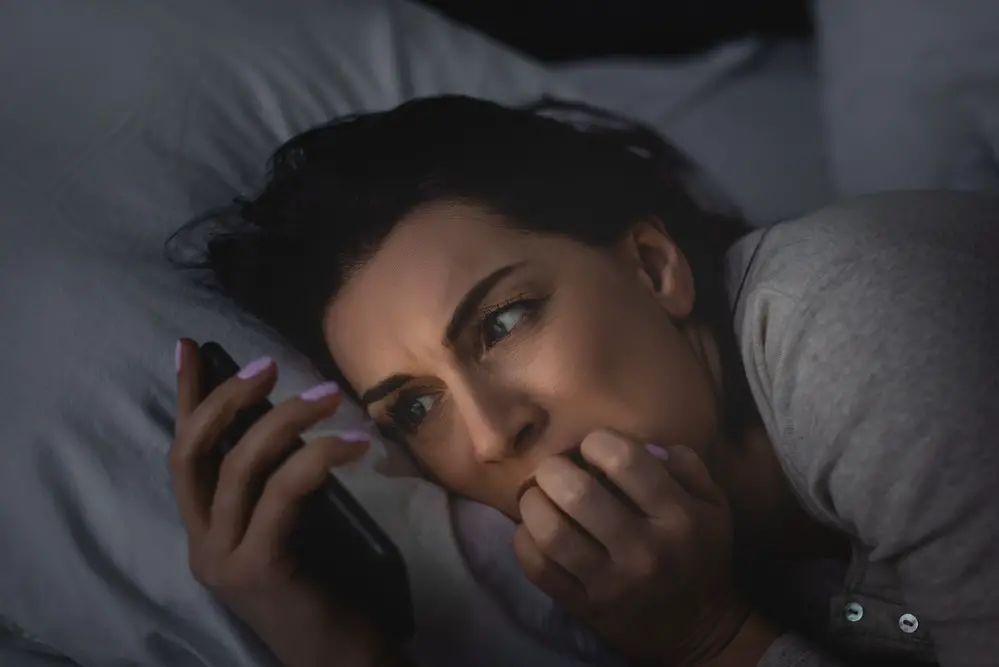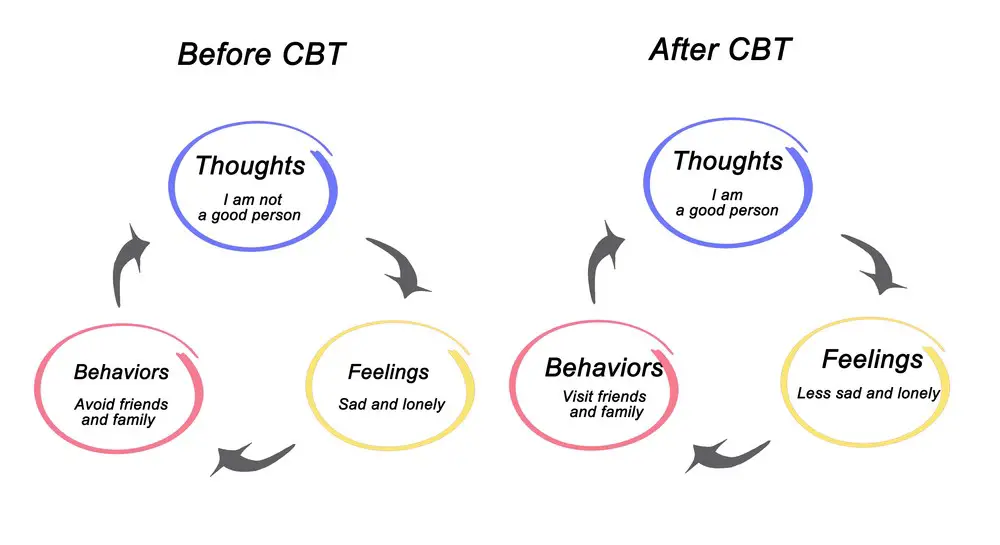As a BetterHelp affiliate, we receive compensation from BetterHelp if you purchase products or services through the links provided
Nothing is more frustrating than tossing and turning all night long, trying to get some rest but feeling anxious and worried instead. Many people find their anxiety at night feels more intense than during the day. There are several reasons why this may be the case, but luckily there are also some things you can do to ease your anxiety and get some sleep.
If you struggle with anxiety at night, read on for four possible explanations and what you can do about them.
Why is anxiety worse at night?
It is not uncommon for us to experience nighttime anxiety. Studies have shown that anxiety is the most common emotion experienced in the evening and early morning hours. There are several reasons why anxiety may be worse at night.
There are fewer distractions at night
When busy during the day, we may not have as much time to focus on our worries and concerns. At night, however, there is often nothing else to do but think about whatever is causing our anxiety.
Our bodies are naturally more relaxed at night. This may seem counterintuitive since anxiety is often associated with feeling tense and on edge. However, when our bodies are physically relaxed, it can be easier for our minds to race and become more anxious.
There is also the fact that we are often tired at night. When tired, we may be more likely to ruminate on negative thoughts and worry about things that might not even happen.

Increased darkness can make you feel more isolated
Another reason why anxiety may be worse at night is that it is darker. This can make us feel more isolated and alone with our thoughts.
Everyone experiences anxiety differently, but feeling alone can be a triggering and overwhelming experience. Talking to someone you trust about your anxiety can help you feel less alone and may even help to reduce your anxiety symptoms.
Nighttime is often when people experience worrisome thoughts
For some people, nighttime is when they are most likely to experience intrusive thoughts or memories. This can be particularly distressing and may make it difficult to sleep.
The quiet environment may make it more difficult to ignore or distract yourself from your thoughts. This can lead to a greater chance of experiencing nocturnal panic attacks or anxiety at night.
Your body’s natural circadian rhythms can make you feel more alert
Another reason you might suffer from nighttime anxiety is that our bodies have natural circadian rhythms that make us feel more alert at night. This is why it can be challenging to fall asleep at night and why many people wake up early in the morning.
Our circadian rhythms can be knocked off track by things like jet lag, working the night shift, or having a baby. This can disrupt our natural sleep patterns and bedtime routine, making it more difficult to fall asleep.
If you’re struggling with anxiety at night, you can do a few things to ease your symptoms and get some rest…

Distract yourself from anxious thoughts
One way to cope with nighttime anxiety is to distract yourself from your anxious thoughts. This can be done by reading a book, watching a movie, or listening to calming music.
It may also be helpful to journal before bedtime. If you suffer from anxiety disorders, writing down your thoughts and concerns can help you get them out of your head and make it easier for you to sleep.
The best way to cope with your nighttime anxiety is to not worry about falling asleep but focus on relaxing your mind and body.
If you find yourself lying in bed awake and anxious, getting up and doing something calming may be helpful. This could involve reading, journaling, or listening to music. It’s important to avoid any activities triggering and worsening your anxiety, such as watching television or browsing the internet.

Try to establish a bedtime routine
One of the best things you can do for nighttime anxiety is to establish a regular bedtime routine. This could involve taking a warm bath, reading a book, or doing gentle stretches before bed.
Sleep deprivation can worsen anxiety, so getting enough sleep is important. This means avoiding caffeine in the evening and ensuring you have a comfortable environment to sleep in.
If you’re struggling to sleep, you can do a few things to improve your sleep hygiene. This includes avoiding screens before bedtime, establishing a regular sleep schedule, and creating a calm environment in your bedroom.
Use relaxation techniques before bed
Another way to ease nighttime anxiety is to use relaxation techniques before bedtime. This could involve deep breathing exercises, progressive muscle relaxation, or visualization. These techniques can help to ease your anxiety symptoms and make it easier for you to fall asleep.
Many psychologists encourage their patients with anxiety and similar mental health problems to take part in breathing training as a way of relaxation and, as a result, reducing anxiety.
Pursed-lip breathing
This involves breathing in through your nose for two counts and then breathing out through your mouth for four counts. This helps to control your breathing and slow down your heart rate.
Diaphragmatic breathing
This involves placing one hand on your stomach and the other on your chest. As you breathe in, your belly should expand. This type of breathing helps to improve your lung capacity and can be helpful for those who suffer from anxiety and panic attacks.

Talk to your doctor if the problem persists
Talking to a mental health professional can be incredibly helpful if you struggle to cope with anxiety disorders. They can provide you with support and guidance on how to manage your symptoms.
Several treatment options for anxiety are available, including therapy, medication, and lifestyle changes. Your doctor can recommend the best course of treatment for you.
Suffering from a panic disorder doesn’t only contribute to poor sleep habits but also your overall well-being. The anxiety and depression association of America reports that people with panic disorders are more likely to experience depression. 44 percent of people with panic disorder also suffer from major depression.
A variety can treat sleep disorders of methods, such as cognitive-behavioral therapy (CBT), relaxation techniques, and exposure therapy. Your doctor can recommend the best course of treatment for you.
Final thoughts: nighttime anxiety and how to calm anxiety
Nighttime anxiety can be a very difficult thing to deal with. However, there are several things you can do to ease your symptoms and make it easier to sleep.
Establishing a regular bedtime routine, using relaxation techniques before bed, and talking to your doctor if the problem persists can all help manage nighttime anxiety.
Talking to a mental health professional can be incredibly helpful if you struggle to cope with anxiety disorders. They can provide you with support and guidance on how to manage your symptoms. Several treatment options for anxiety are available, including therapy, medication, and lifestyle changes. Your doctor can recommend the best course of treatment for you.
FAQs
- 7 Ideas to Help You Relax and Unwind on a Family Vacation - April 27, 2025
- How Having Cybersecurity Protection Helps You Relax - April 25, 2025
- 8 Reasons Why Spending Time Outside Calms You Down - April 25, 2025
This site contains affiliate links to products. We will receive a commission for purchases made through these links.



